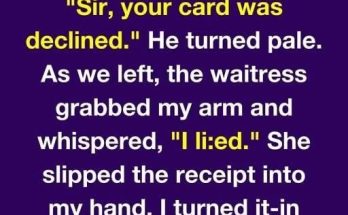When my mother-in-law passed away, I expected grief. What I didn’t expect was relief.
For years, she had made her dislike for me painfully clear. She never hid her disapproval in her glances, her clipped remarks, or the long silences that lingered when I walked into the room. Not once had she offered me the warmth I longed for.
So when the memorial ended and my husband quietly pressed a small box into my hands, my first instinct was confusion.
“She wanted you to have this,” he said. His expression unreadable.
I frowned. “Me? Are you sure?”
He nodded. “She was very clear. She said you should open it today. Alone.”
That word—alone—echoed in my chest.
The Necklace with My Initials
Later that night, when the house was still, I finally opened the box.
Inside lay a silver necklace with a delicate teardrop pendant, set with a tiny sapphire. It shimmered softly, as if it had been waiting years for this moment.
I turned it over in my hand—and froze.
Etched faintly on the back were two initials: L.T.
My initials.
Was it a coincidence? Or had this been meant for me long before today?
As I searched the box again, my fingers brushed against folded paper. A letter. My name written in her sharp, unmistakable script.
I hesitated, my pulse quickening. Then, with trembling hands, I opened it.
The Letter I Never Expected
Her words stunned me.
“If you’re reading this, I’m gone. And if you’re reading this, it means I finally grew a spine. I never said it when I should have, but I was wrong about you. All along. And I need to tell you why.”
I couldn’t breathe. This woman, who had only ever judged me, was admitting fault?
*“I hated you not because of who you were, but because of what you reminded me of. I saw myself in you—young, ambitious, opinionated. I used to be like that, until I gave it all up for marriage, for appearances, for people who never said thank you.
When you married my son, I feared he would ruin you the way his father ruined me.”*
My eyes blurred with tears. My husband wasn’t like his father. But maybe, in her eyes, she saw shadows I couldn’t.
“So instead of loving you, I judged you. I pretended you weren’t enough, when the truth was, you were more than I ever dared to be. And I regret that.”
I pressed the paper to my lips, my chest tight. All those years of coldness, and only now, in death, did she finally say what I had needed to hear.
Then came the last lines:
“The necklace was mine once. A gift from a man I loved before I met my husband. His name was Lucas—the L. I added the T later, for the daughter I never had. I wanted a girl I could raise to be strong. I never had her. But in a strange way, I see her in you.”
I didn’t sleep much that night.
The Key That Opened the Past
A week later, her lawyer called us in for the reading of the will. Most of her possessions were simple: the house, a modest savings account, some jewelry.
Then the lawyer handed me a sealed envelope.
“She left a special clause for her daughter-in-law,” he said, passing it to me.
Inside was a small brass key. And a note: “She’ll know what it’s for.”
At first, I didn’t. But then I remembered—the attic. A little door she had once snapped at me never to open.
We drove to her house. The place felt smaller without her, quieter somehow. Behind a faded curtain, we found the attic door. My hand shook as I slid the key into the lock.
The door creaked open, releasing the scent of cedar and dust. Inside sat an old trunk.
I lifted the lid.
Inside were dozens of journals.
The Woman I Never Knew
Her handwriting filled page after page.
Dreams of painting. Regrets about choices she made. Loneliness she never confessed. Longing for Paris she never saw. Love letters to Lucas, the man she let go.
In one journal, a photo of a watercolor she had painted: a woman standing alone in a garden. On the back, she had written: “Me, before I disappeared.”
My throat closed.
She had been an artist. A dreamer. A woman who lost herself to duty, to appearances, to bitterness.
I spent hours reading, tears dripping onto the pages. I finally saw the woman behind the cold exterior. She hadn’t hated me. She had hated the reflection of what she once was, staring back at her.
A New Beginning from Her Legacy
Weeks later, inspired, I submitted one of her paintings to a local art show under a pseudonym. To my astonishment, it was accepted. People called it “quietly heartbreaking.”
I submitted more. Soon, a gallery contacted me.
When I explained that the true artist was my late mother-in-law, they asked for an exhibition. It wasn’t large, but it was real. People stood before her art and wept, seeing themselves in the quiet ache of her brushstrokes.
I wish she could have seen it. Or maybe, in her way, she knew.
Then another letter came from her lawyer. A safety deposit box, accessible only to me. Inside was a check for $40,000—and another note.
“If you ever decide to chase your dream, this is my way of helping. Don’t tell my son. He wouldn’t understand. But you will.”
I cried harder than I had in years.
With that money, I opened a small gallery downtown—a place for overlooked artists, especially older women who had never been given a chance. I named it The Teardrop. After her necklace. After her.
What She Really Left Me
It has been three years.
The necklace rests against my collarbone almost every day. The journals are archived in the back of the gallery, open to anyone who wants to know the woman she truly was.
My husband visited once. He stood in front of her painting of the garden woman and whispered, “I never knew she felt this way.”
Neither did I.
But now the world knows. And maybe that’s the point.
Sometimes, apologies don’t come in words spoken aloud. Sometimes, they come in what’s left behind—in a necklace, in a trunk of journals, in the truth hidden in an attic.
If you’ve ever felt unwanted, judged, or unloved, remember this: sometimes it isn’t about you. Sometimes the coldest hearts are carrying the heaviest wounds.
And sometimes, forgiveness doesn’t arrive wrapped in a bow—but it can still set you free.



